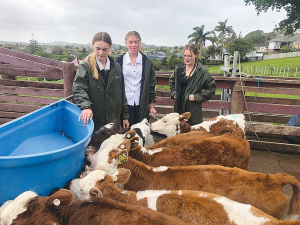Dairy Women’s Network welcomes AgriHealth as new partner
Dairy Women's Network (DWN) is welcoming AgriHealth as a new partner.
 Mt Albert Grammar student Rose Young (on right) with Kaitlyn Sanders and Pippi Butterworth, attend to the job of feeding the calves at ASB MAGS Farm.
Mt Albert Grammar student Rose Young (on right) with Kaitlyn Sanders and Pippi Butterworth, attend to the job of feeding the calves at ASB MAGS Farm.
Livestock grazing on a farm with a good view of Auckland’s Sky Tower is the story behind the latest Dairy Women’s Network visual story telling project Our People, Their Stories.
Mt Albert Grammar (MAGS) student Rose Young says she knows she is not quite a typical Auckland city teenager.
“It’s central Auckland, which is a bit crazy for me to be into agriculture I guess,” she told Dairy News, referring to the ASB MAGS 8.1ha working farm.
“But when I’m here I don’t feel like I’m at school. I feel like even though I’m learning so much while I’m doing it, it’s more or less just something I’d love to do anyway.”
The farm was set up in 1932, when the Auckland Horticultural Society decided that city children were losing knowledge of farming practices and asked Mount Albert Grammar to teach agriculture and horticulture.
The Auckland Savings Bank became involved, and special legislation was passed to allow the bank to buy land from the neighbouring Kerr-Taylor sisters’ farm and lease it back to the school at a peppercorn rental.
Out of its multicultural roll of over 3000 it now educates over 200 students annually from years 10-13 in agricultural and horticultural science, with these urban kids getting a unique opportunity to experience rural farm life without leaving the city.
ASB MAGS farm experience centre development manager Peter Brice says the farm is all about connecting kids with opportunities at the heart of New Zealand’s national identity -- the agri-food and fibre sector.
“It’s about milking dairy cows, shearing sheep, pruning vines, whatever it might be,” he said. “It’s pretty special, 8ha in the middle of Auckland with 260 agri, hort and agribusiness kids, which we’ve grown from 180 18 months ago.”
ASB MAGS farm advisory group chair Mark Heer says the farm connects and engages with city school students who would not normally be exposed to a rural environment.
“A strength of the Dairy Women’s Network is engagement and connection, which aligns well with the goal of the ASB MAGS Farm to engage and connect the agri food and fibre industries with urban school students,” he said.
Heer adds that it’s all about creating more awareness and understanding about rural farm life and taking that to greater New Zealand.
Young says there are days when she’s in school with her friends and looks out the window and spots Brice working on the farm and they contemplate writing a sign saying ‘get us out Peter, let us help you’.
“It’s very different from what I’m used to, or what anyone in Auckland is used to,” she said. “It’s great to get outside and for girls it is really cool and especially because we have such great female teachers who get us into it as well.”
In 2013, a new lease agreement was signed between ASB and the Mount Albert Grammar School board of trustees whereby the bank leases the land to the school for a 99 year term at a nominal annual rent of $1.
There are plans to build a new agri food and fibre experience centre which Brice says could be a central hub for agribusiness in Auckland.
Dairy Women’s Network chief executive Jules Benton says it has been a wonderful experience getting into heartland New Zealand to meet fantastic people and tell their amazing stories.
“It has been truly special,” she said. “The first two stories have been well received and we know this one will be too as it’s quite different from the first two.”
For Young, who has set her sights on a career in agriculture after leaving school, the farm makes going to school much more motivating. “It’s our little slice of New Zealand right in the city which is awesome to have.”
Changed logos on shirts otherwise it will be business as usual when Fonterra’s consumer and related businesses are expected to change hands next month.
Reflecting on the past year, Horticulture New Zealand chief executive Kate Scott says there has been a lot to celebrate.
Ministry for Primary Industries (MPI) Director General Ray Smith is giving a big shout-out to the horticulture sector, especially kiwifruit.
Early forecasts for New Zealand's apples and pears point to a standout season marked by exceptional fruit quality and high pack-out rates.
Tickets are now available for Beef + Lamb New Zealand’s (B+LNZ) Out the Gate, returning from 19-21 May 2026 at Te Pae, Christchurch.
Dairy Women's Network (DWN) is welcoming AgriHealth as a new partner.
OPINION: Fonterra may be on the verge of selling its consumer business in New Zealand, but the co-operative is not…
OPINION: What does the birth rate in China have to do with stock trading? Just ask a2 Milk Company.